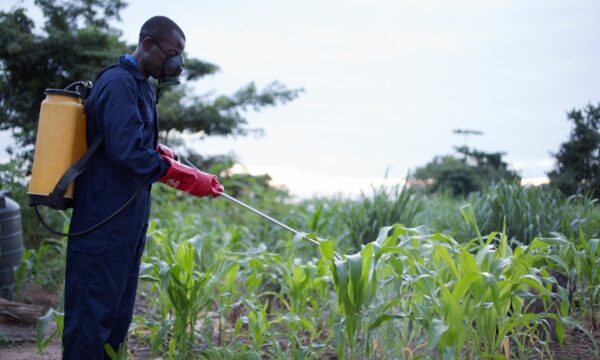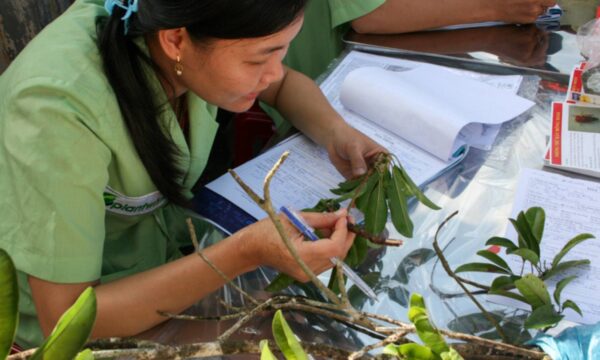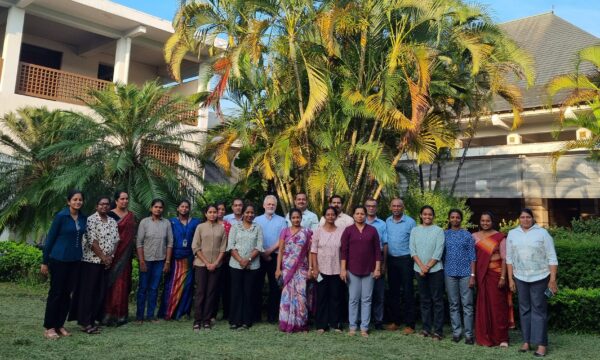In India, 59 per cent of women work in agriculture. This workforce is vital to the country’s rural economy, with women performing many of the big farming jobs, such as planting, weeding, tending, and harvesting crops.
Despite this, many women do not self-identify as farmers. Systemic inequality and the roles women and girls are expected to fill limit their access to resources. Women farmers are the caregivers as well as workers, which ultimately affects the health of their families and communities.

This International Women’s Day, we spoke to Madhu Manjari, CABI’s PlantwisePlus Digital Tools Coordinator in India. Manjari talked about her experiences working with women farmers in India, their particular struggles, and how PlantwisePlus is helping to address these challenges.
Hi Manjari, can you tell us about yourself and your work in agriculture?
I am Madhu Manjari, the Agri Digital Tools coordinator for CABI PlantwisePlus in South Asia. I am an agriculture graduate with a master’s in agribusiness. I have 16 years of experience working in agriculture, focusing on livelihood promotion and value chain intervention. I worked for the Indian government for nine years, supporting farmers, farmers’ cooperatives, and other groups in different states.
What is your experience working with women farmers?
Before joining CABI, I worked for a national nonprofit promoting farmer livelihoods. During that time, I assisted four women farmer producers’ organizations (FPO) under a project funded by AEIN Luxemburg in Andhra Pradesh and Telangana. We started from scratch, mobilizing the farmers, creating farmer groups and building their capacity. The aim was to enable women farmers to take up business activities independently. After successfully implementing the first four women’s FPOs, we helped set up six more funded by the Andhra Pradesh Department of Horticulture. In total, the project reached around 10,000 women farmers.
In India, what are the primary roles of women farmers?
Women are involved in almost all the activities related to planting, harvesting, weeding, drying, winnowing, and post-harvest management.
However, women farmers face many challenges, such as the lack of land rights, which is a critical issue in rural India. In addition, limited access to finance, information on inputs, technology, and schemes are all challenges for women in agriculture. Societal barriers are also prevalent in some parts of India, meaning women cannot attend meetings or capacity-building events. This limits their access to agricultural information and advice.
How is CABI approaching these challenges for women farmers?
Many NGOs in India provide institutional support in bringing women together in cooperatives. These cooperatives deal with the challenges I mentioned and help build the capacity of women farmers through training and exposure visit programs.
Many activities in agriculture are assumed to be the man’s responsibility, such as fertilizer and pesticide application. The main reason is that many women farmers lack knowledge and skills. They don’t know about pest identification, which pesticides to use or how much, or spray solution preparation. CABI is helping women build their agricultural knowledge and skills by making the information available through apps such as Crop Sprayer, CABI BioProtection Portal, and PlantwisePlus Knowledge Bank. These digital tools also help women farmers use suitable plant protection activities, including non-pesticide management practices.

At CABI, your role is to promote the use of agri-digital tools. Can you tell us about your work?
My primary focus is enabling various stakeholders in the agriculture production system to know about and use the available advisory tools. I am responsible for partnership engagement and ensuring the key players know and understand the Open-access advisory tools and use the technology to maximize food security and safety.
How can digital tools help women farmers?
Digital tools can help women become more active in agriculture, boost their productivity, and improve their livelihoods. We are helping women farmers better understand the basis of plant health issues through the CABI Academy digital learning courses, which are now free in India. The PlantwisePlus Knowledge Bank and Factsheet Library app help them better understand their country’s specific problems. And the CABI BioProtection Portal and Crop Sprayer app empower them with integrated pest management support.
Are there barriers to women accessing digital tools?
Yes, the availability of smartphones for farmers is an issue. These are still a luxury, especially for women farmers. Internet speed in rural areas is also a significant problem, especially in hilly areas. Most women have 2G, making downloading and using the apps hard. CABI has ensured that most of our decision support tools are available offline so farmers can use them even without the internet.
The digital tools can support women farmers in areas where societal constraints such as social norms and childcare stop them from receiving face-to-face agricultural advice. However, we must ensure that the content and format of digital tools and services are relevant and accessible to women farmers. This is a key aim of the PlantwisePlus programme.
PlantwisePlus: enhancing women’s access to plant health advice
Addressing the gender gap is important because both men and women have equal rights to participate in and benefit from development interventions. Women play a key role in agriculture worldwide, constituting 53% of the global agricultural workforce.
A key part of the PlantwisePlus programme is enhancing women’s knowledge and uptake of climate-smart plant health practices. The programme equips agricultural advisory services with decision-making tools to advise women farmers. Extension agents are increasingly making use of new plant health solutions. We must ensure both men and women farmers can access and benefit from their advisory services.
Related News & Blogs
How do pest risk registers address the spread of plant pests in Africa?
Pest risk registers can help to solve problems in agriculture, addressing the growing global threat of plant pests. Moreover, changing weather patterns, led by rising temperatures, are causing them to reproduce faster and expand into new regions. In ad…
10 July 2025




